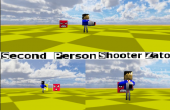Christopher Pottecary
An English and Drama student who watches too many films, plays too many games and reads too many books. Has a genuine interest in most things, often with an opinion to match!
Contributor I
- Plebian Penman
- Lurker
- Pssst
- Sharp-Eyed Citizen
- ?
- Articles
6 - Featured
6 - Comments
62
- Ext. Comments
16 - Processed
7 - Revisions
6
- Topics
0 - Topics Taken
0 - Notes
1
- Topics Proc.
0 - Topics Rev.
0
- Points
887 - Rank
157 - Score
452
Latest Articles
Latest Comments
| The Potential of Second-Person Perspective Games: The Aesthetics of Shooting Yourself | |
According to what I have read, trailers were originally “trailed” after the feature and served an important function besides advertisement: they helped clear patrons out of the current show. Early theatres repeated a loop of movies and it was standard practice for customers stay as long as they wanted. Apparently, intersecting trailers between the films helped break up the hypnotic flow of entertainment and encouraged patrons to leave the cinema. | Time to Trim Trailers? The Death of Surprise in Modern Hollywood |
Richard says that “the King’s name is a tower of strength” (5.3.12), alluding to the Old Testament proverb, “The name of the Lord is a strong tower” (Proverbs 18.10). This alteration of godly authority into kingly power, especially in the context of towers and the power of words, suggests that the Tower of London parallels the Biblical tower of Babel, where God confounded human speech for their overreaching acts of ambitious building. It is in this atmosphere of discordant language and usurpation that Richard so eloquently gets away with murder. After all, he is the very incarnation of linguistic violence, or, as Shakespeare prophesises: the “G” / Of Edward’s heirs the murderer shall be” (1.1.39-40). | Shakespeare's Richard III: The Power of Speech |
When Satan enters Paradise, Milton writes: ‘At one slight bound high overleaped all bound / Of hill or highest wall’ (IV.181–2). On the one hand, ‘bound’ means ‘constraint’, which suggests that Satan has transgressed the morals of a hierarchical universe. On the other hand, ‘bound’ also means ‘jump’, with Satan’s ‘overleaping’ demonstrating his physical grandeur and implying an upwardly mobile world. It could be said, then, that Milton’s contradicting wordplay offers readers the freedom and responsibility to choose between a fallen and a prelapsarian interpretation of his punning language, a burdensome choice that is essential to the meaning of his poem. | Paradise Lost: A Shift in Narrative Language After the Fall |
I guess all that screenshots of frames I took paid off! Thanks for commenting. | Fantasmagorie: Sex, Gender and the Elephant in the Room |
I guess hide and seek would be the most practical game to play with the second-person perspective: No need to aim! Thanks for commenting. | The Potential of Second-Person Perspective Games: The Aesthetics of Shooting Yourself |
Theatre is a difficult one for second-person because, unlike film, video games and literature you don’t necessarily have a fixed or singular perspective. And even if you do, like the proscenium arch, the question of who is the first-person is problematic, the actor is an agent as well as the audience member. If the first-person perspective is taken to be the viewpoint the audience, then a second-person perspective of ‘you’ would be a recreation of the audience’s current situation – whether through performance, film or even mirrors – being shown back to them. If the first-person perspective is that of the actor, then the second-person perspective would be the perception of him acting by another actor. If you had enough smart phones or cameras, with each actor having one to constantly broadcast his perspective and another to show him the current viewpoint of a different actor, then you could get some semblance of second-person perspective. If you identify the proscenium as not dissimilar to the camera’s perspective, then it becomes first-person if the actors break the fourth wall and talk to the audience as a character (like a found-footage film where the camera is, for all intents and purposes, a character) and it becomes third-person if they simply interact with each other on stage. It would seem that in either case the second-person is observing the audience watch and the actors act. This seems to be almost like a real-time documentary, showing you how the play is being viewed and performed as it happens. If each audience member had access to moveable cameras – on drones, remote control cars or actors, for instance – and could only see the performance and themselves from that perspective, then there’s an element of second-person there as well. Hope this helps. | The Potential of Second-Person Perspective Games: The Aesthetics of Shooting Yourself |
I loved this game! A very good article. My nostalgia has been triggered. | Dark Cloud: A Tale of Forgiveness |






While I think there is merit in your argument, because virtual reality and holographic environment simulators are more likely to recreate the direct agency and smooth engagement commonly associated with a first-person experience in everyday life, I would argue that you seem to ignore or downplay how important agency and engagement are in constituting the particular “personness” of an experience. For example, if an experienced individual is working repetitively on an assembly line – and can do their work automatically without directly even thinking about it – they may also begin to daydream intensely about being a superhero; in such a situation, the engaging fantasy may feel like a first-person experience and yet they may not even recall or experience that they are doing boring and uninteresting assembly work – it may feel to them like somebody else or even nobody is really doing the work. Likewise, if a game is sufficiently engaging, immersive and provides a sense of agency then a player may indeed feel like it is a first-person experience, whereas a game that is boring, glitchy or frustrating may well lose its immersion and the player will feel “narrated to” or distant from the action – even if it is in a hypothetical holodeck. As such, I think it is interesting that you describe the experience of first-, second- or third-person games as being inevitably “narrated to you by the computer,” because scholars such as Brenda Laurel would argue that computers are more equivalent to a theatrical experience: “The willing suspension of disbelief,” she writes, “can be seen to occur almost identically in drama and computer games, where we feel for and with the characters (including ourselves as characters) in very similar ways.” (Computers as Theatre; 2014, p. 139) In fact, the language commonly used by players seems to go against your rather strict hypothesis. When a player gets killed in a first-person game they normally say “I died” or “I lost,” not “Master Chief died” or “he died.” When they kill an enemy player, they may say “you died” or “I killed you,” not “James Bond killed Oddjob.” The reason such “literally-speaking” phrasing seems nonsensical is because it denies the self-evident agency of the “players” and speaks as if nobody (or somebody else) was actually playing the game or even as if that it isn’t really a “playable” game. Often, people use “I” when playing a game but switch to using the name of the playable character precisely when explaining the narrative of a game to others, i.e. when they are not personally engaged with the game or are describing the canonical storyline they couldn’t alter. For example, if they are recounting their own playthrough they will probably say “I did this and then I did this,” but when recalling the storyline will likely say “in the previous game, Master Chief had to do X.”